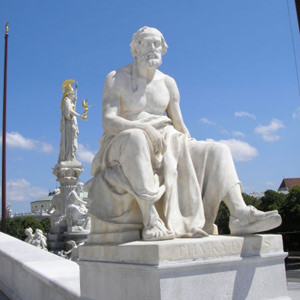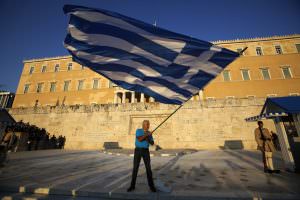Ancient Words Our Leaders Should Heed
Let us now praise famous men. And after yet another U.S. presidential candidates' debate of awesome sterility I'm referring principally to one of the first journalists to understand war and, so far as he could, to check his sources: Thucydides.
Editor’s note: This article was originally posted at The Independent.
Let us now praise famous men. And after yet another U.S. presidential candidates’ debate of awesome sterility – not to mention their shameless refusal to tackle the real, bloody issues that confront America – I’m referring principally to one of the first journalists to understand war and, so far as he could, to check his sources: Thucydides.
If only our masters would turn to his account of the Peloponnesian conflict they might even see their own faces – and their hideous mistakes – in the mirror of his prose.
I have to admit that I was inspired to reread the great man’s fourth-century BC tract by Professor David Rovie of the Auckland University of Technology, who startled a weary Fisk in New Zealand a few weeks ago by pointing out that Thucydides’ work contained all the lessons we need to learn about war, human rights, the treatment of prisoners, the cowardice of politicians, and the cold-hearted decisions of nation states.
Thucydides himself said – it is, of course, his most famous quotation – that it was enough for him that his words “be judged useful by those who want to understand clearly the events which happened in the past and which (human nature being what it is) will, at some time or other and in much the same ways, be repeated in the future”.
His work, Thucydides wrote – and I am using Rex Warner’s translation – was “not a piece of writing designed to meet the taste of an immediate public but was done to last for ever”. Well, he can say that again. How many of our historians or journalists or novelists or playwrights work for those who will (despite the internet) still read them in 2,000 years’ time? Tolstoy maybe, Shakespeare, I imagine. But will the historians of our latter-day wars – the Beavors and the Barnetts and the Bullocks, even the Churchills – be read in 4008? Certainly Thucydides would have had no time for newspaper reporters: “prose chroniclers”, he sneers, are “less interested in telling the truth than in catching the attention of their public, whose authorities cannot be checked”. Ouch.
At school, I found the 27-year war between Athens and Sparta, which began in 431BC, a very tiresome affair. Indeed, its miniature battles, in which a modern-day “surge” might involve only 200 men, are pretty boring. But Thucydides was also a soldier; by failing to save an Athenian colony from the Spartans, he was sent off to 20 years of exile. And his account of this ancient conflict contains a dark and chilling relevance today.
Take Cleon, who had just passed the motion for a death sentence against the entire male population of Mytilene (all women and children, of course, were to be slaves) because of their revolt against Athens. Just listen to this truly 9/11 speech. “He who has suffered for no good reason is a more dangerous enemy … Place yourselves in imagination at the moment when you first suffered and remember how then you would have given anything to have (your enemy) in your power. Now pay them back for it … Punish them as they deserve, and make an example of them to your other allies, plainly showing that revolt will be punished by death.”
After the international crimes against humanity of 2001, George Bush launched Cleon’s antique “war on terror”. Those who had attacked America, who had rebelled against us because they “hated our democracy”, were to be punished and punished with death as many hundreds of thousands ultimately were.
The wise voice of Diodotus – “if we are sensible people, we shall see that the question is not so much whether they are guilty as whether we are making the right decision for ourselves” – succeeds in sparing the citizens of Mytilene (albeit for strictly selfish reasons). But our only Diodotus after 9/11 was [French President Jacques] Chirac, who showed the Athenians’ selfishness if nothing else.
Now here is Alcibiades, urging the Athenians to advance on Sicily: “Remember that the city (Athens) … in conflict … will constantly be gaining new experience and growing more used to defend itself, not by speeches, but in action.” Here is the projection of Athenian military power.
Despite Nicias’s warning that “it would be disgraceful if we … were forced to send back later for reinforcements owing to insufficient foresight to begin with”, the Athenians eagerly set off for their ancient version of an Iraqi debacle.
As Thucydides writes, “The Athenians … became more enthusiastic than ever … it was now thought that the expedition was an absolutely safe thing. There was a passion for the enterprise which affected everyone alike … The result of this excessive enthusiasm of the majority was that the few who actually were opposed to the expedition were afraid of being thought unpatriotic if they voted against it, and therefore kept quiet.” Ah, so much for the three-line whips of Athenian democracy and of the House of Commons and of the U.S. Congress.
For those who want to compare Bush’s early abandonment of the war in Afghanistan for a new adventure in Iraq, try Nicias again, who warned that “in going to Sicily you are leaving many enemies behind you, and you apparently want to make new ones there and have them also on your hands … there are so many (Sicilians) and they live so far off that it would be very difficult to govern them. It is useless to go against people who, even if conquered, could not be controlled … My opinion is, too, that Sicily, as it is at present, is not a danger to us …”.
No, Sicily had no weapons of mass destruction, but the Athenians eagerly set off to military disaster. Had Bush heard of Thucydides? Did Blair have a dim remembrance from his schooldays? Any thoughts, Senator Obama, you who voted “No”? Oh, hell – just send a copy to Sarah Palin. On a clear day she could probably see Sparta from Athens.
Your support matters…Independent journalism is under threat and overshadowed by heavily funded mainstream media.
You can help level the playing field. Become a member.
Your tax-deductible contribution keeps us digging beneath the headlines to give you thought-provoking, investigative reporting and analysis that unearths what's really happening- without compromise.
Give today to support our courageous, independent journalists.



You need to be a supporter to comment.
There are currently no responses to this article.
Be the first to respond.